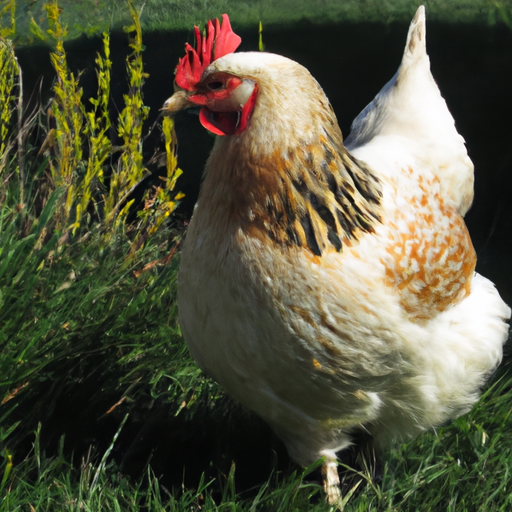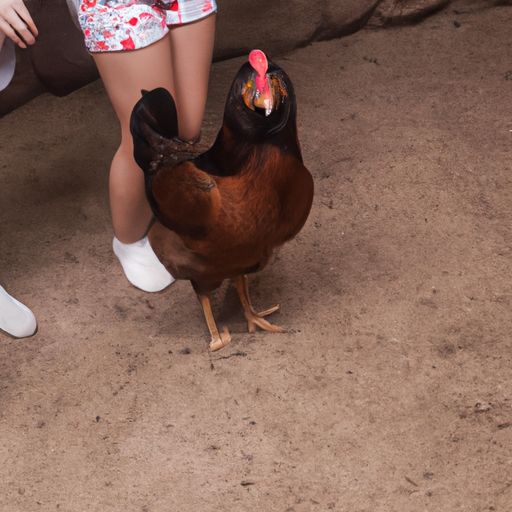You love your chicken flock and want them to thrive, but sometimes their behavior can be a bit unruly. Whether it’s excessive pecking, aggressive behavior, or a lack of cooperation, training and conditioning positive behaviors in your chicken flock is essential for a harmonious and productive coop. Thankfully, there are several effective techniques you can utilize to encourage and reinforce positive behavior in your feathered friends. By implementing these methods consistently, you can create a happy and well-behaved flock that not only provides you with fresh eggs but also makes the daily chicken chores a breeze.
Understanding Chicken Behavior
Understanding the Natural Behavior of Chickens
To effectively train and condition positive behaviors in your chicken flock, it’s crucial to have a good understanding of their natural behavior. Chickens are social animals that thrive in a flock environment, so it’s important to provide them with opportunities to engage in their natural instincts, such as foraging, dust bathing, and roosting.
Chickens are also hierarchical animals that establish a pecking order within their flock. This means that they will naturally establish dominance and submissive roles among themselves. Understanding this social structure can help you better manage their interactions and prevent aggressive behaviors.
The Importance of Positive Behaviors in a Chicken Flock
Positive behaviors in a chicken flock contribute to the overall wellbeing and productivity of the birds. Chickens that exhibit positive behaviors, such as being calm, social, and cooperative, are more likely to be healthier, lay more eggs, and have better quality meat.
Positive behaviors also promote a harmonious social environment within the flock, reducing stress and improving overall welfare. By training and conditioning positive behaviors, you can create a flock that is not only well-behaved but also happy and content.
Creating a Positive Environment
Providing Adequate Space for Chickens
One of the key factors in promoting positive behaviors in your chicken flock is providing them with adequate space. Overcrowding can lead to stress, aggression, and the development of negative behaviors. It is recommended to allow at least 4 square feet of space per bird in the coop and a minimum of 10 square feet per bird in the outdoor run.
Maintaining a Clean and Hygienic Environment
A clean and hygienic environment is important for the health and wellbeing of your chickens. Regularly cleaning the coop, removing droppings, and providing fresh bedding not only prevents diseases but also promotes positive behaviors. Chickens are naturally drawn to clean areas, and a dirty and unhygienic environment can lead to stress and negative behaviors.
Offering a Balanced and Nutritious Diet
A well-balanced and nutritious diet is essential for the physical and mental wellbeing of your chickens. Providing them with a diet that includes a variety of grains, greens, protein, and supplements will not only keep them healthy but also satisfy their natural foraging instincts. A satisfied and well-fed chicken is less likely to develop negative behaviors, such as aggression or feather pecking.
Building Trust and Connection
Spending Quality Time with Your Chickens
To build trust and connection with your chickens, it’s important to spend quality time with them. This can include sitting quietly with them, talking to them in a calm and soothing voice, and offering treats as positive reinforcement. Regular interaction and gentle handling will help your chickens see you as a trusted and friendly presence.
Handling Chickens Gently and Properly
Proper handling techniques are crucial for building trust and avoiding stress in your chickens. Always approach them slowly and calmly, avoiding sudden movements that may startle them. To pick up a chicken, place one hand under their breastbone and gently lift them, supporting their body with your other hand. Avoid squeezing or gripping too tightly, as this can cause fear and discomfort.
Using Positive Reinforcement Techniques
Positive reinforcement is a powerful tool in training and conditioning positive behaviors in your chicken flock. By rewarding desired behaviors, such as coming when called or remaining in designated areas, with treats or praise, you can reinforce those behaviors and encourage your chickens to continue exhibiting them. This creates a positive association and motivates them to repeat the desired actions.
Training Basic Commands
Teaching Chickens to Come When Called
Teaching your chickens to come when called is not only a useful command but also a safety measure. Start by using a distinct and consistent sound, such as shaking a container of treats, as the cue for them to come. Each time you use the cue, reward the chickens that respond with treats. With practice and repetition, they will learn to associate the cue with the reward and come when called.
Encouraging Chickens to Stay in Designated Areas
To encourage your chickens to stay in designated areas, such as the coop or a specific part of the yard, you can use a combination of positive reinforcement and boundaries. Initially, provide treats when they stay within the desired area and gently guide them back if they stray. Over time, they will learn to associate the area with rewards and develop the habit of staying there.
Training Chickens to Perch or Roost on Command
Training your chickens to perch or roost on command can be beneficial for their safety and convenience. Start by using a verbal cue or a hand signal, such as raising your hand, as the command for them to perch. Initially, guide them to the perching spot and offer treats as a reward. With consistent training and positive reinforcement, they will learn to perch on command.
Socializing Chickens
Introducing New Chickens Gradually
When introducing new chickens to the flock, it’s important to do it gradually to minimize stress and potential conflicts. Begin by keeping the new chickens in a separate but adjacent area for a few weeks, allowing them to see and interact with the existing flock without direct contact. This gradual introduction helps the chickens become familiar with each other’s presence and reduces the likelihood of aggression.
Encouraging Positive Interactions within the Flock
Positive interactions among flock members are essential for a harmonious social environment. Provide plenty of opportunities for your chickens to engage in natural behaviors together, such as foraging or dust bathing. This not only promotes positive socialization but also reduces boredom and aggression.
Minimizing Aggression and Establishing a Pecking Order
Aggression is a natural part of establishing a pecking order within the flock, but it should be managed to ensure the wellbeing of all chickens. Provide multiple feeding and watering stations to reduce competition, and ensure there are enough roosting spots for everyone. If aggression becomes excessive, separate the individuals involved temporarily and reintroduce them gradually using positive reinforcement techniques.
Preventing and Managing Unwanted Behaviors
Identifying and Addressing Aggressive Behaviors
Aggressive behaviors can be detrimental to the overall welfare and productivity of your chicken flock. It’s important to identify and address aggressive behaviors early on. This can include excessive pecking, bullying, or attacking other chickens. Remove any injured or overly aggressive birds from the flock temporarily, and consider rehoming them if the behavior persists.
Dealing with Excessive Noise or Disturbances
Excessive noise or disturbances, such as loud noises or predators, can cause stress and undesirable behaviors in chickens. Minimize such disturbances by providing a secure and quiet environment for your flock. Consider soundproofing the coop or using calming measures, such as playing soft music or providing hiding spots, to reduce stress levels.
Managing Egg Pecking or Eating
Sometimes, chickens may develop a behavior known as egg pecking or eating, where they peck or consume their own eggs. This behavior can be managed by providing appropriate nesting boxes with soft bedding to prevent eggs from breaking and becoming a target. Adding calcium supplements to their diet can also help prevent them from seeking extra calcium from their eggs.
Enhancing Chicken Welfare
Providing Enrichment Activities and Toys
Enrichment activities and toys are important for keeping your chickens mentally stimulated and preventing boredom. Provide items such as perches, swings, or pecking blocks to encourage natural behaviors and prevent negative behaviors, such as feather pecking or aggression. Regularly rotate and introduce new toys to keep your flock engaged and entertained.
Ensuring Optimal Health and Veterinary Care
Maintaining the optimal health of your chickens is crucial for their overall welfare and ability to exhibit positive behaviors. Schedule regular veterinary check-ups and vaccinations to prevent diseases. Monitor their body condition and behavior for any signs of illness or distress. Provide appropriate nutrition, clean water, and proper ventilation to promote good health.
Monitoring and Reducing Stress in the Flock
Stress can have a significant impact on the behavior and welfare of your chicken flock. Monitor their environment for potential stressors, such as extreme temperatures, excessive noise, or overcrowding. Take steps to minimize and reduce these stressors, such as providing shade, maintaining optimal temperature, and ensuring adequate space. Creating a calm and stress-free environment will help your chickens exhibit positive behaviors.
Training Chickens for Specific Tasks
Training Chickens to Use a Litter Box
Training chickens to use a designated litter box can make coop cleaning easier and maintain a cleaner environment. Start by placing a litter box in the coop with a suitable litter material, such as wood shavings or straw. Each time you see a chicken using the litter box, reinforce the behavior with treats or praise. Gradually, they will learn to associate the litter box with a positive experience and use it consistently.
Teaching Chickens to Go to Their Coop at Night
Training chickens to go to their coop at night is important for their safety and protection from predators. Establish a consistent routine by feeding them in the coop in the evening and closing the coop door after they have entered. Over time, they will learn to associate the coop with safety and naturally return to it at night.
Training Chickens to Exhibit Exhibition Behaviors
If you plan to participate in poultry shows or exhibitions, training your chickens to exhibit certain behaviors can be beneficial. This can include teaching them to stand still for examination, walk properly on a leash, or show off their plumage. Use positive reinforcement, such as treats or praise, to reward desired exhibition behaviors and practice regularly to enhance their skills.
Troubleshooting and Challenges
Dealing with Stubborn or Non-Responsive Chickens
Some chickens may be more stubborn or non-responsive to training compared to others. If you encounter this challenge, it’s important to be patient and consistent in your training efforts. Adjust your training methods, such as using higher-value treats or different cues, to find what motivates them. Break down commands into smaller steps and reward any progress they make. With persistent training, even stubborn chickens can learn positive behaviors.
Addressing Flock Dynamics and Social Challenges
Maintaining a harmonious flock dynamic can sometimes be challenging, especially when dealing with chickens of different ages or backgrounds. Intervene when necessary to prevent excessive aggression or bullying, and adjust the flock’s composition or housing arrangements if needed. Observe individual chickens for signs of stress or welfare issues and take appropriate actions to ensure their wellbeing.
Overcoming Distractions and Disturbances
Distractions and disturbances can hinder the training and conditioning of positive behaviors in your chicken flock. When facing these challenges, it’s important to create a calm and controlled environment for training. Minimize external noises, secure the training area, and establish a routine to help your chickens focus on the desired behaviors. Consistency and patience are key to overcoming distractions and achieving successful training outcomes.
Final Thoughts
The Importance of Patience and Consistency
Training and conditioning positive behaviors in your chicken flock require patience and consistency. Chickens are individuals with different personalities and learning abilities, so it may take time for them to fully grasp and exhibit the desired behaviors. Be patient with their progress, and consistently reinforce positive behaviors through training and positive reinforcement techniques.
Enjoying the Fruits of Training and Positive Behaviors
By investing time and effort in training and conditioning positive behaviors in your chicken flock, you will be rewarded with a well-behaved and content flock. Enjoy the benefits of having chickens that come when called, stay in designated areas, and exhibit positive social behaviors. Not only will these positive behaviors contribute to the overall welfare of your chickens, but they will also enhance your own enjoyment and satisfaction as a chicken keeper.




